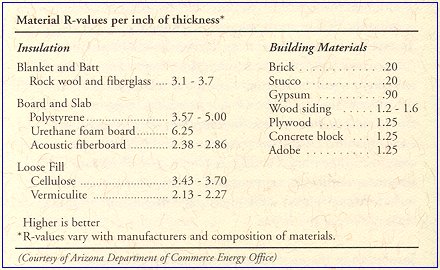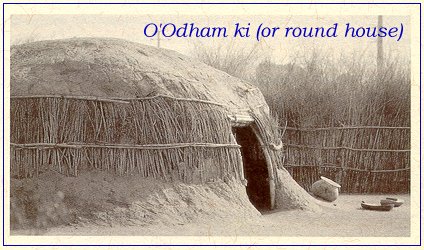
 |
 |
| Builders use R-value
to describe heat resistance of building material. The higher the R-value, the more
resistant the material is to the transfer of heat. A building constructed with high R-value
materials is easier and more cost effective to maintain comfortable temperatures. Cooling
and heating systems do not have to work as hard or as long, thereby reducing the amount of
energy needed to operate the system. The following table provides the R-values of Common Construction Materials: |
 [ US
Department of Energy: R-value Recommendations for Eight Insulation Zones ] |
Montezuma's Castle
effectively uses the principles of thermal mass and insulation in the following ways:
Throughout the arid southwest ingenious developments in architectural technology can be
idenfified in the homes of historic and modern inhabitants. The O'Odham ki, or
round house provides protection from heat, cold, and wind. |
 |
| During the winter
the ki can be sealed tight with adobe to keep the cold out, but during the summer the
brush walls can be left open to allow air to freely blow through the structure and cool
the occupants through evaporation of perspiration of their body surface. The brush walls
of the ki can be moistened to provide a greater surface area for water to evaporate. This
evaporation will reduce the air temperature inside the house. Other passive cooling characteristics include vertically oriented ventilation shafts, such as stairwells, high ceilings, chimneys or ducts. These shafts allow lighter hot air to rise and escape during the day and dense cool air to enter and descend during the evening. Wind capturing devices, known as malqafs in Arabic, resemble a chimney and funnel air into buildings. Cooling towers are a modern version of this old technique. These towers use moistened pads to further inhance the cooling effect caused when dense cool air drops. Fountains and ponds can also contribute both psychological benefits with pleasing sensory experience and some cooling effect. |
| [ Return to Desert House:
Table of Contents Page ] [ Next: Desert House - Passive Solar Heating and Cooling ] © 1999 DESERT BOTANICAL GARDENS. Last Modified: March 29, 1999 |